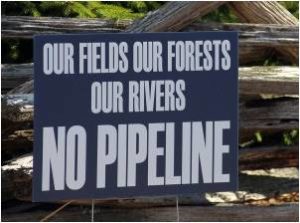 In our region, there has been much coverage of the pipeline’s risks to water sources, unfair use of eminent
In our region, there has been much coverage of the pipeline’s risks to water sources, unfair use of eminent
domain, and threat to our forests and public lands. Less attention has been paid to the need for the project, or rather, the lack of need.
The truth is that Dominion’s justification for building the now $7 billion project has steadily eroded over the past four years. And the facts are finally making their way into view.
In Sunday’s Washington Post, former Attorney General Ken Cuccinelli writes a hard-hitting Op-Ed, Virginia has a Pipeline Problem. Cuccinelli blasts Dominion for raising its customers’ power bills by up to $2.5 billion over the next 20 years to pay for the ACP while failing to demonstrate that the pipeline is even needed.
I am not opposed to natural-gas pipelines, and I’m not opposed to eminent domain for appropriate and necessary projects. But I am opposed to captive monopoly customers shouldering the cost and risk of Dominion projects that are rubber-stamped without anyone at any level asking whether the pipeline provides value to Virginians.
And a week earlier, in the Virginia Mercury, former Richmond Times-Dispatch reporter wrote The Con at the Heart of the Atlantic Coast Pipeline, where he explains how Dominion got federal approval for the project by contracting with itself to show market demand. He quotes Dominion’s propaganda touting the benefits of the project, and then writes:
The only way you can still believe that [the pipeline is needed] is if you steadfastly refuse to look behind the curtain.
Here is what’s behind the curtain: The large majority (79%) of the pipeline’s capacity is slated to serve new power plants, and Dominion claims that demand for energy is growing. In reality, demand for new energy is flat. That means we don’t need new power plants in Virginia. Independent analyses show that there is sufficient capacity in existing gas pipelines to meet demand long into the future.
But the permitting agencies haven’t looked closely at the whether the pipeline is needed. Instead, they have chosen to rely on Dominion’s customer contracts to demonstrate that there is market demand for the natural gas. And since Dominion is both the pipeline developer and the pipeline customer, these purchase agreements are with its own subsidiaries. It has contracted with itself to show market demand for the project and gain permit approvals.
At the end of the day, the ACP is a great business decision for Dominion with its guaranteed 15% rate of return. But it leaves Dominion’s customers to foot the bill (up to $2.5 billion over 20 years) for expensive, unneeded new infrastructure.
The pipeline’s impacts on our land, water and communities will be severe. For our region to bear this burden, without a demonstrated need for the energy, is too much to ask.
For more on our Pipeline Campaign.

